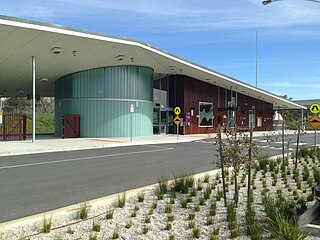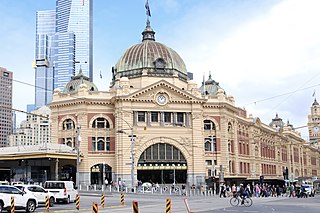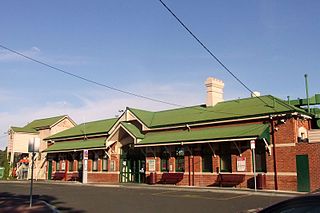
The Puffing Billy Railway is a 2 ft 6 in narrow gauge heritage railway in the southern foothills of the Dandenong Ranges in Melbourne, Australia. The railway was one of the five narrow gauge lines of the Victorian Railways which opened around the beginning of the 20th century. It is close to the city of Melbourne and is one of the most popular steam heritage railways in the world, attracting tourists from Australia and overseas. The railway aims to preserve and restore the line and its operation as closely as possible to the way it was in the first three decades of its existence, but with particular emphasis on the early 1920s.

Oakleigh railway station is a commuter railway station in the suburb of Oakleigh in the south-east of Melbourne, Victoria, Australia. The station opened in 1877 as the up end of the Gippsland line, with the station being electrified in 1922. The station consists of two sides that are connected to each other via the adjacent roads, and both platforms are connected to each other via a pedestrian subway.

Upper Ferntree Gully railway station is a commuter railway station on the Belgrave line, serving the eastern Melbourne suburb of Upper Ferntree Gully in Victoria, Australia. Upper Ferntree Gully is a ground level premium station, featuring an island platform with two faces. It opened on 4 December 1889, with the current station provided between 1960 and 1962 respectively.

Tecoma railway station is a commuter railway station on the Belgrave line, serving the eastern Melbourne suburb of Tecoma in Victoria, Australia. Tecoma is a ground level unstaffed station, featuring one side platform. It opened on 1 December 1924, with the current station provided in 1962.

Belgrave railway station is a commuter railway station and the terminus of the Belgrave line, serving the eastern Melbourne suburb of Belgrave in Victoria, Australia. Belgrave is a ground level premium station, featuring an island platform with two faces. It opened on 18 December 1900, with the current terminus station provided in 1962.

Fairfield railway station is a commuter railway station on the Hurstbridge line, which is part of the Melbourne railway network, and serves the north-eastern suburb of the same name. It opened on 8 May 1888. Originally called Fairfield Park, the station was re-named Fairfield on 14 November 1943.

Cockatoo railway station is situated on the Puffing Billy Railway in the town of the same name. It opened with the line on 18 December 1900 as Devon, but was renamed Cockatoo Creek on 29 July 1901 and subsequently shortened to Cockatoo in 1904. There was originally a platform road and a loop siding, but a crossing loop was later added in between the two. A single 12ft by 20 ft timber portable station building was provided which was later extended. Other associated buildings such as toilets and a van good shed were also on the platform while a weatherboard goods shed was provided on the loop siding.

Wodonga railway station is located on the North East line in Victoria, Australia. It serves the city of Wodonga, and it opened on 25 June 2011.

The Melbourne rail network is a metropolitan suburban and freight rail system serving the city of Melbourne, Victoria, Australia. The metropolitan rail network is centred around the Melbourne central business district (CBD) and consists of 222 railway stations across 16 lines, which served a patronage of 99.5 million over the year 2021–2022. It is the core of the larger Victorian railway network, with regional links to both intrastate and interstate rail systems.

Bacchus Marsh railway station is located on the Serviceton line in Victoria, Australia. It opened on 10 February 1887, and serves the town of the same name, although the station is in the southern suburb of Maddingley.

The Walhalla Goldfields Railway is a 2 ft 6 in narrow gauge tourist railway located in the Thomson River and Stringers Creek valleys in Gippsland, Victoria, Australia, near the former gold-mining town and tourist destination of Walhalla.

The Ararat railway line is a railway line in Victoria, Australia. It links the state capital of Melbourne to the cities of Ballarat and Ararat via the Regional Rail Link. It once extended to Serviceton railway station at the then-disputed South Australian border as part of the Melbourne–Adelaide railway until 1995 when the broad gauge line beyond Ararat was converted to standard gauge and reopened as part of the 1435 mm Western standard gauge railway line.

Wangaratta railway station is located on the North East line in Victoria, Australia. It serves the town of the same name, and opened on 28 October 1873.

The former Victorian Railways, the state railway authority in Victoria, Australia, built a number of experimental 2 ft 6 in narrow-gauge lines around the beginning of the 20th century. Although all were closed by the early 1960s, parts of two have been reopened as heritage railways.

Glenrowan is a closed station located in the town of Glenrowan, on the North East line in Victoria, Australia. The station is located at the highest point of the line north of Seymour, with grades of 1 in 75 in both directions. In June 1880, the station was the site of what became the last stand of Ned Kelly and his gang, with a monument located at the station today.

The Victorian Railways G class is a class of steam locomotives built for the Victorian Railways 2 ft 6 in gauge branch lines by Beyer, Peacock & Company. They were introduced in 1926 to increase train sizes, eliminate the practice of double heading NA locomotives and reduce losses on these lines. Their tractive effort was comparable to the most powerful branch line locomotives on the Victorian Railways 5 ft 3 in, the K class.

Hamilton is a railway station located on the Ararat - Portland railway in the city of Hamilton, Victoria, Australia. Today the station is now used only for through trains, and the large station building is used only to serve bus passengers, although the disused platform remains in reasonable condition.
Unlike the broad-gauge, the Victorian Railways' 2 ft 6 in narrow-gauge network never had four-wheeled trucks. Instead, a single design of 249 underframes was constructed, with identical structure, bogies, couplers and brake equipment. Different bodies were provided on these frames for each purpose. The most common, by far, was the convertible flat/open truck, followed by cattle, louvred, insulated and boxcar types.

Crowes was a railway station located in the Otway Ranges. It is noted for having been the southernmost railway terminus in mainland Australia.
This article outlines the history and types of passenger rolling stock and guards vans on the narrow-gauge lines of the Victorian Railways in Australia. The types were constructed in parallel with very similar designs.




















